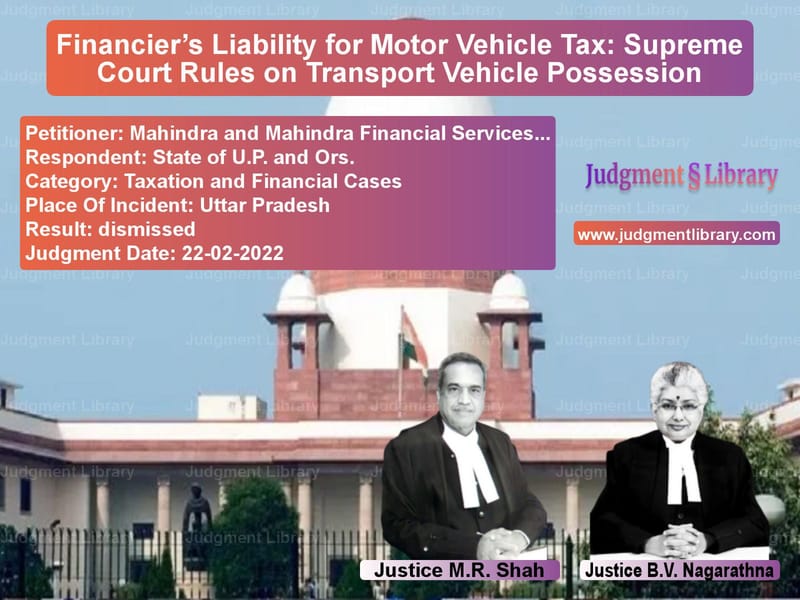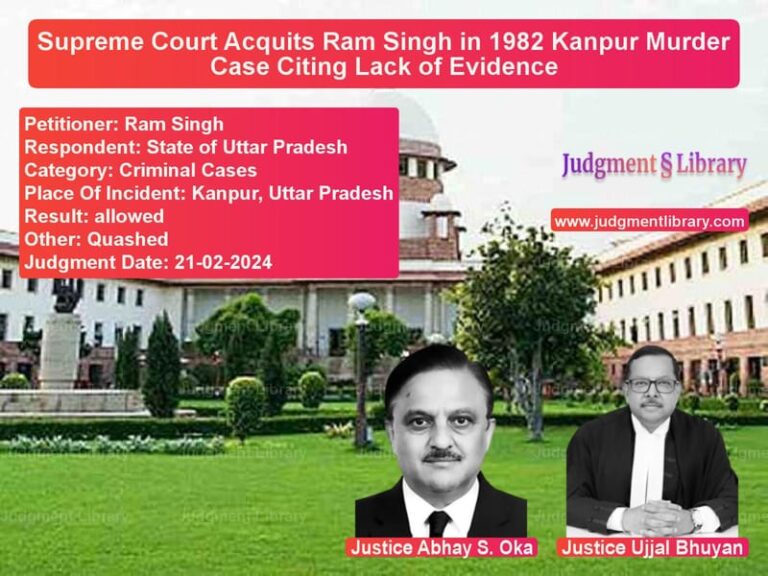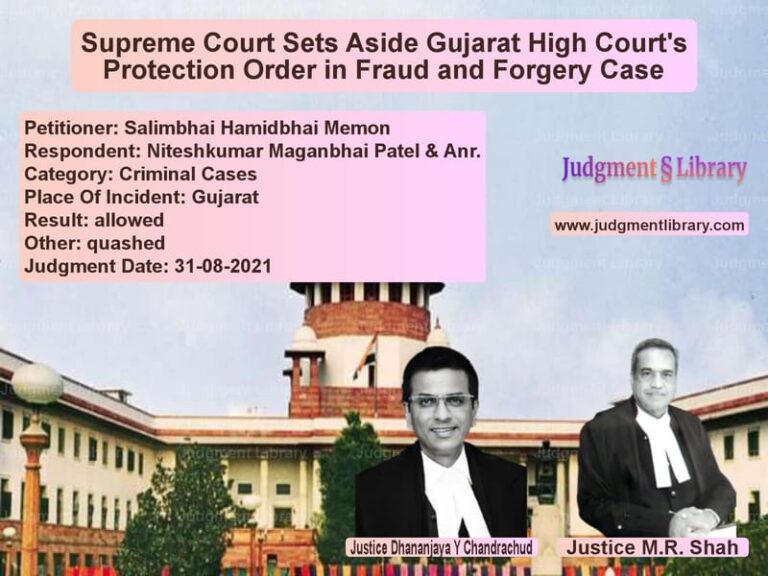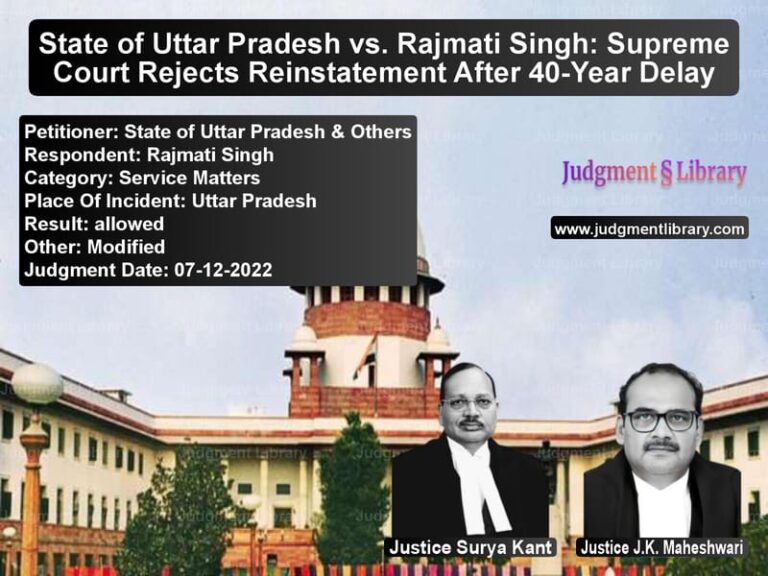Financier’s Liability for Motor Vehicle Tax: Supreme Court Rules on Transport Vehicle Possession
The case of Mahindra and Mahindra Financial Services Ltd. vs. State of U.P. & Ors. addresses the crucial legal question of whether a financier-in-possession of a transport vehicle, due to loan default by the owner, is liable to pay motor vehicle tax under the U.P. Motor Vehicles Taxation Act, 1997. The Supreme Court, in this case, upheld the ruling of the Allahabad High Court and confirmed that the financier, being in possession of the vehicle, is liable to pay the tax.
Background of the Case
Mahindra and Mahindra Financial Services Ltd. extended a loan for the purchase of a transport vehicle. Due to default in loan repayment, the financier took possession of the vehicle under the terms of the hypothecation agreement. The dispute arose when the Uttar Pradesh transport authorities demanded motor vehicle tax from the financier under the U.P. Motor Vehicles Taxation Act, 1997.
The key legal issue was whether a financier, merely because of being in possession of the vehicle, could be treated as the “owner” under the Act and be held liable for tax payments.
Legal Provisions in Question
The case primarily involved the interpretation of the following provisions:
- Section 2(h) of the U.P. Motor Vehicles Taxation Act, 1997: Defines “owner” to include a financier in possession of a vehicle under a hire-purchase or hypothecation agreement.
- Section 4(2-A): Imposes a liability to pay tax before a transport vehicle can be used in a public place.
- Section 9: Mandates advance payment of tax.
- Section 12: Allows for refund of tax if the vehicle is not used for a continuous period.
Petitioner’s Arguments
The counsel for Mahindra and Mahindra Financial Services Ltd. argued that:
- The financier had taken possession of the vehicle due to non-payment of the loan but had not put the vehicle to use.
- Under the taxation scheme, liability arises only when a vehicle is used, and since the financier had merely repossessed the vehicle, it could not be taxed.
- The tax should be levied on the registered owner of the vehicle and not on the financier.
- Since the financier did not have possession of the registration certificate or permit, it could not even claim a tax refund under Section 12.
Respondents’ Arguments
The State of Uttar Pradesh countered with the following arguments:
- Under Section 2(h) of the Taxation Act, the financier-in-possession is deemed to be the “owner” and is, therefore, liable to pay tax.
- The taxation framework is based on the principle of “pay the tax first, and then claim a refund if the vehicle is not used”.
- Under Section 12, an owner intending not to use the vehicle must surrender the registration certificate and permit to claim exemption from tax.
- The financier had taken possession of the vehicle but had not surrendered the necessary documents; hence, liability for tax continued.
Supreme Court’s Observations
The Supreme Court examined the provisions of the Act in detail and observed:
“As per Section 2(h) of the U.P. Motor Vehicles Taxation Act, 1997, read with Section 2(30) of the Motor Vehicles Act, 1988, a financier in possession of a transport vehicle due to loan default is an ‘owner’ for the purposes of tax liability.”
The Court further held:
“The requirement under the law is to pay the tax in advance before the vehicle is used. If the financier claims that the vehicle is not in use, the appropriate remedy is to surrender the required documents and seek a refund under Section 12.”
Final Verdict
The Supreme Court dismissed the appeal by Mahindra and Mahindra Financial Services Ltd., upholding the Allahabad High Court’s ruling. The Court concluded:
“The liability to pay tax arises first; only then can the owner or financier claim a refund for non-use. The financier-in-possession cannot escape tax liability by merely claiming non-use without following the procedure prescribed under the Act.”
Impact of the Judgment
This ruling has far-reaching implications for vehicle financiers:
- Clarifies the tax liability of financiers: Financiers who repossess vehicles due to loan defaults must be aware that they are liable to pay vehicle tax unless they take steps for exemption.
- Emphasizes compliance with tax regulations: If the vehicle is not to be used, the financier must surrender the registration and permit to claim tax relief.
- Prevents tax evasion: The ruling ensures that vehicles do not escape taxation merely because they have been repossessed.
Conclusion
The Supreme Court’s judgment in Mahindra and Mahindra Financial Services Ltd. vs. State of U.P. & Ors. reinforces the legal principle that a financier-in-possession of a transport vehicle is an “owner” under tax laws and must pay motor vehicle tax unless it follows the proper procedure for exemption. The ruling sets a significant precedent in motor vehicle taxation, ensuring that tax obligations are met even in cases of loan defaults and vehicle repossession.
Petitioner Name: Mahindra and Mahindra Financial Services Ltd..Respondent Name: State of U.P. and Ors..Judgment By: Justice M.R. Shah, Justice B.V. Nagarathna.Place Of Incident: Uttar Pradesh.Judgment Date: 22-02-2022.
Don’t miss out on the full details! Download the complete judgment in PDF format below and gain valuable insights instantly!
Download Judgment: mahindra-and-mahindr-vs-state-of-u.p.-and-or-supreme-court-of-india-judgment-dated-22-02-2022.pdf
Directly Download Judgment: Directly download this Judgment
See all petitions in Banking Regulations
See all petitions in Tax Refund Disputes
See all petitions in Judgment by Mukeshkumar Rasikbhai Shah
See all petitions in Judgment by B.V. Nagarathna
See all petitions in dismissed
See all petitions in supreme court of India judgments February 2022
See all petitions in 2022 judgments
See all posts in Taxation and Financial Cases Category
See all allowed petitions in Taxation and Financial Cases Category
See all Dismissed petitions in Taxation and Financial Cases Category
See all partially allowed petitions in Taxation and Financial Cases Category







